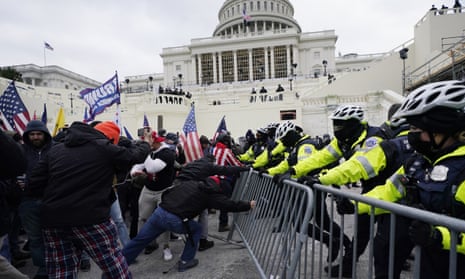House Democrats plan on Wednesday to unveil a $2.1bn supplemental bill to enhance security at the Capitol that will propose creating a quick reaction force to guard against future threats in the wake of the Capitol attack, according to sources familiar with the matter.
The proposed bill will also include the construction of a retractable fencing system around the Capitol, the sources said.
Rosa DeLauro, chair of the House appropriations committee, is expected to unveil the proposal to House Democrats on a caucus call on Wednesday, amid growing calls urging the adoption of recommendations made by a taskforce in the wake of the 6 January insurrection in which a pro-Trump mob ransacked the Capitol.
No lawmakers were injured during the attack, but several, such as Senator Mitt Romney and former vice-president Mike Pence had only a narrow escape from attackers looking for them. Meanwhile, nearly 140 officers suffered injuries and one, Brian Sicknick, later died after being assaulted.
The proposed bill largely tracks recommendations made by retired Army Lt Gen Russel Honoré, who was appointed by the House speaker, Nancy Pelosi, to examine security shortcomings, as well as critical flaws identified by the US Capitol police inspector general, the sources said.
In the report released to House Democratic leaders last month, Honoré made a series of recommendations, including hiring more than 800 US Capitol police officers, the construction of mobile fencing around the Capitol, and an overhaul of the US Capitol police board.
“We are trying to take into consideration understanding what happened, how do we account for that and what we need to do to prevent this from happening again,” DeLauro said of the taskforce recommendations after its release last month.
The proposed bill, which could be brought to the House floor as early as next week, will also include a provision to reimburse the national guard deployed around the Capitol. The national guard and other security measures post-6 January is costing nearly $2m a week.
Its prospects are still uncertain on Capitol Hill, with House Democrats largely going ahead with the security review alone and Republicans yet to indicate what measures, if any, they are willing to embrace.
Lawmakers in both parties largely agree on the need for enhanced security but some – Republicans in particular – have been agitating to scale back the barriers encircling the area and troops patrolling the grounds despite lingering threats.
“While there may be some worthy recommendations forthcoming, Gen Honoré’s notorious partisan bias calls into question the rationality of appointing him to lead this important security review,” Kevin McCarthy, the House minority leader, said of the taskforce in March.
“It also raises the unacceptable possibility that the speaker desired a certain result: turning the Capitol into a fortress.”
The issue has exposed the divide between members of Congress who want the Capitol to return to a sense of normalcy, and the concerns of US Capitol police and a raft of law enforcement agencies tasked with their protection.
